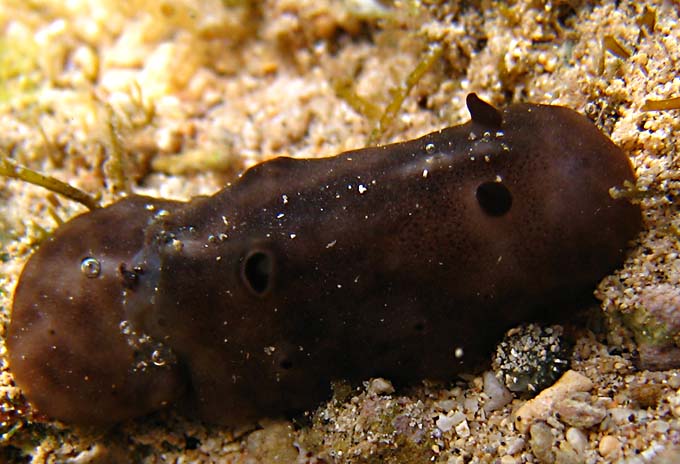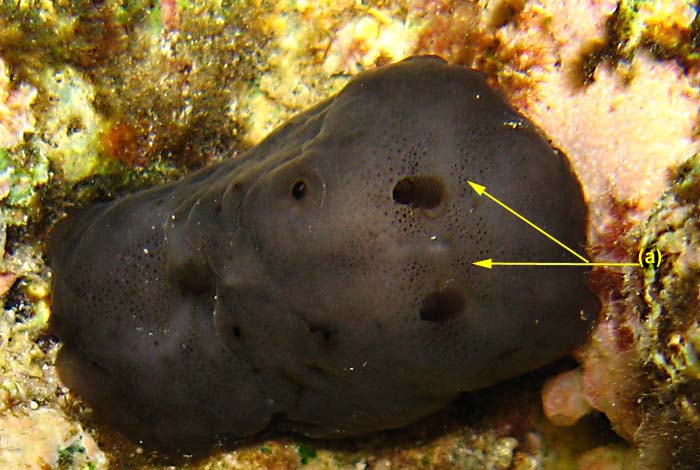This species has been observed on Reunion and Mayotte Islands
Species characteristics : The dorsum is covered with several simple conical tubercles scattered irregularly. Some of them are much larger and have a depression on the apex The background color varies from cream brownish to dark brown or gray. Some specimens are almost black The small clump of gills is characteristically held in a closed circlet forming a goblet ( all the tips pointed inwards and almost touching, forming a globe) |

|
|
| Showing species characteristics... | Photo Christophe Cadet Reunion, Etang salé on the rocky coast, less 1 m, 2 January 2012, size : 25 mm |
|
Remarks :
Identification confirmed by Nathalie Yonow and Bill Rudman
Synonymous (according worms) :
- Actinocyclus laevis, (Bergh, 1890)
- Spaerodoris laevis, Bergh, 1890
Bibliographic data :
The body is elevated, short, oval, almost as long as wide. The central part of the body is clearly elevated over the mantle margin, which is relatively narrow
There are paler areas, generally white or yellowish, irregularly distributed on the dorsum. The entire dorsum is covered with small, evenly distributed black spots.
The perfoliate rhinophores are composed of 20 lamellae in a 33 mm long specimen. They are the same color as the body.
There are 16 unipinnate branchial leaves in the 33 mm long specimen. They bare dark gray or black, with numerous small white spots, more densely distributed near the base.
The egg masse is a white ondulated ribbon
The texture of the notum is firm and leathery to the touch and obviously cryptic colored allowing it to blend protectively on the sponges it feeds upon. It fe teds on sponges that lack spicules. Some specimens even have marking that resemble the oscula of the sponge.
References :
Bill Rudman Seaslug site : Sea Slug Forum : Actinocyclus verrucosus
Nudipixel Actinocyclus verrucosus
Publications :
Bergh, L. S. R. (1878) Malacologische Untersuchungen. In: C.G. Semper, Reisen im Archipel der Philippinen, Wissenschaftliche Resultate . Band 2, Heft 13: 547-601,Pls.62-65
Ehrenberg, C. G. (1828 or 1831) Symbolae physicae seu
icones et descriptiones animalium evertebratorum sepositis insectis quae ex itinere per Africam borealem et Asiam Occidentalem--novae aut illustratae redierunt. Decas 1 Mollusca.
Eliot, C. N. E. (1913) Japanese nudibranchs. Journal of the College of Science, Tokyo Imp. University, 35: 1-47. (Pls.1-2)
Risbec, J. (1956) Nudibranches du Viet-Nam. Archives du Museum National d'Histoire Naturelle Paris , 7 4, 1-34. (Pls. 1-22)
Valdés, A. (2002) Review of the genus Actinocyclus Ehrenberg, 1831 (Opisthobranchia: Doridoidea). The Veliger 45: 193-202
Other photos of Actinocyclus verrucosus :
Christophe Cadet Reunion, Etang salé onthe rocky coast, less 1 m, December 2010, size : 45 mm The small clump of gills is characteristically held in a closed circlet forming a goblet (a) The dorsum is covered with several simple conical tubercles scattered irregularly. Some of them are much larger and have a depression (b) on the apex |
 |
 |
Matthias Deuss Mayotte, Moutsoumbatsou, less 1 m, 4 July 2009, size : 30 mm
|
Guillaume Boeye Reunion, Saint Leu lagoon, less 1 m, 3 February 2007, size : 25-30 mm In this specimen the entire dorsum is covered with small, evenly distributed black spots (a).
|
 |
 |
Christophe Cadet Reunion, Etang salé onthe rocky coast, less 1 m, 28 December 2013, size : 20 mm The background color varies from cream brownish to dark brown or gray. |
Chritophe Cadet Reunion, Etang salé les bains on the rocky coast, less 1 m, 29 December 2011 , size : 15 mm A green form of A. verrucosus according Nathalie Yonow Like this specimen
|
 |
More photos from Indian Ocean